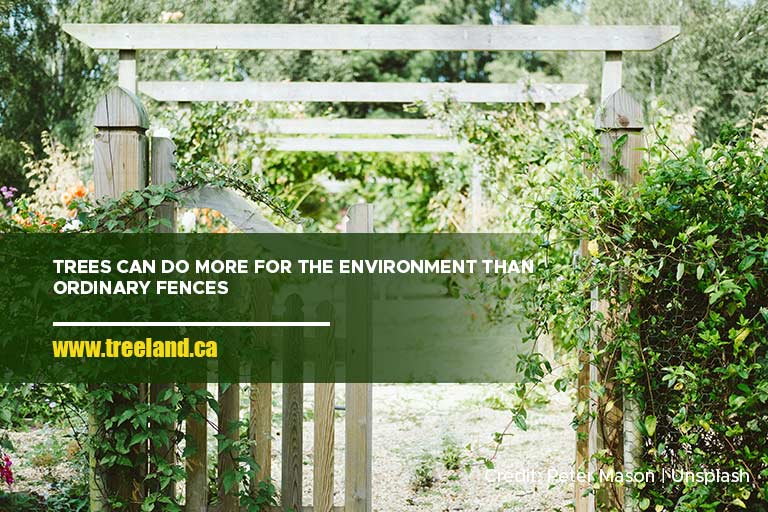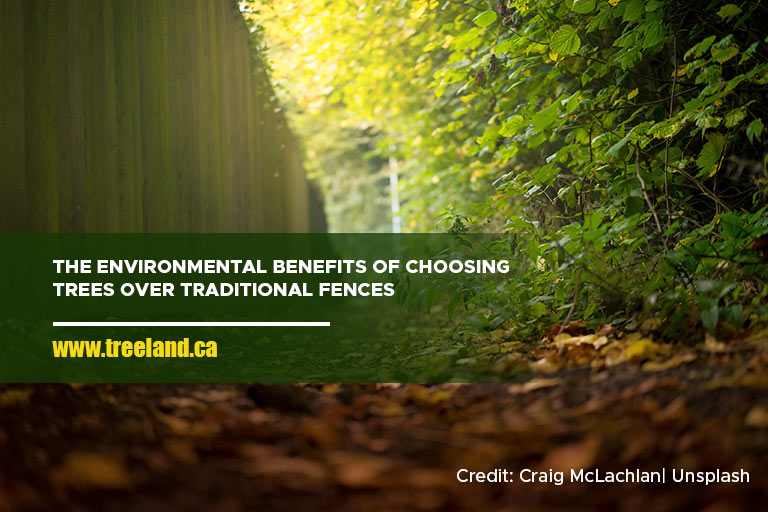When considering ways to enhance your property, the debate often comes down to traditional fencing versus planting trees. While fences have long been the go-to choice for privacy and boundary marking, trees offer a range of environmental benefits that make them a compelling alternative. In Toronto, Canada, where urban landscapes can benefit greatly from green solutions, choosing trees over traditional fences aligns with both ecological and aesthetic goals.
Why Trees Outshine Traditional Fences

Reducing Carbon Footprint
One of the most significant environmental benefits of trees is their ability to reduce the carbon footprint of a property. Trees absorb carbon dioxide from the atmosphere during photosynthesis, helping to offset greenhouse gas emissions. This natural process not only contributes to cleaner air but also combats climate change. In contrast, traditional fences, often made from materials like metal or plastic, do not offer such ecological advantages and can even contribute to pollution during their manufacturing and disposal.
Improving Air Quality
Trees play a crucial role in enhancing air quality. They filter pollutants such as dust, smoke, and other particulate matter, making the air healthier to breathe. By incorporating trees into your landscape instead of installing a fence, you can contribute to cleaner, fresher air in your local environment. This is particularly valuable in urban areas like Toronto, where air quality can be a concern due to traffic and industrial activities.
Mitigating Urban Heat Island Effect
The urban heat island effect refers to the phenomenon where urban areas experience higher temperatures than their rural surroundings due to human activities and the density of buildings and infrastructure. Trees help mitigate this effect by providing shade and releasing moisture into the air through a process called transpiration. This cooling effect can lower temperatures around your property and reduce the need for air conditioning in nearby buildings, leading to less energy consumption and a smaller carbon footprint.
Additional Environmental Benefits of Trees
Conserving Water
Trees contribute to water conservation in several ways. Their root systems help to absorb and manage rainwater, reducing the risk of soil erosion and stormwater runoff. This natural water management helps replenish groundwater supplies and prevents water pollution. Traditional fences, on the other hand, do not have any impact on water conservation and can sometimes contribute to water runoff problems if not properly installed.
Providing Habitat for Wildlife
Trees offer essential habitats for a variety of wildlife, including birds, insects, and small mammals. By planting trees, you create a supportive environment for local fauna, promoting biodiversity and ecological balance. This is a key advantage over traditional fences, which do not provide any habitat and can even act as barriers to wildlife movement.
Enhancing Soil Health
Tree roots contribute to soil health by preventing erosion, improving soil structure, and adding organic matter. This results in healthier soil that supports a wide range of plants and contributes to the overall health of the local ecosystem. Traditional fences do not have any impact on soil health and can sometimes disrupt natural soil processes if improperly installed.
Choosing the Right Trees for Your Property

Selecting Environmentally Friendly Trees
When opting for trees, it’s important to choose species that are well-suited to your local climate and soil conditions. In Toronto, Canada, native trees are often the best choice as they are adapted to the local environment and require less maintenance. Species such as Maple, Oak, and Pine are excellent options for enhancing both the beauty and environmental health of your property.
Planting and Maintenance Tips
Proper planting and maintenance are crucial for maximizing the environmental benefits of your trees. Ensure that you plant trees in a location where they will receive adequate sunlight and water. Mulching around the base of the trees can help retain moisture and suppress weeds. Regular pruning and monitoring for pests will keep your trees healthy and thriving.
Elevate Your Gardening Experience with Stunning Evergreens
Integrating trees into your garden not only benefits the environment but also enhances your outdoor space. Stunning evergreens and creative styling can transform your property into a beautiful and serene retreat. For expert advice on selecting and planting the right trees, contact Caledon Treeland at (905) 880-1828. Their team will help you elevate your gardening experience and create an environmentally friendly landscape.
Choosing trees over traditional fences offers numerous environmental benefits that contribute to a healthier and more sustainable property. From reducing carbon footprints and improving air quality to conserving water and providing wildlife habitats, trees provide valuable ecological advantages. By selecting the right species and properly maintaining them, you can enhance your property while supporting environmental health. Elevate your gardening experience with stunning evergreens and creative styling, and make a positive impact on the environment.

